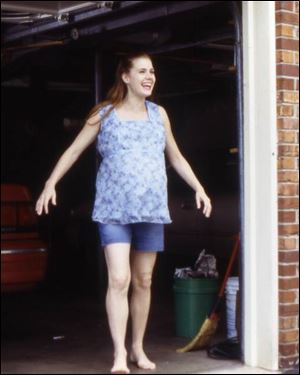
Movie review: Junebug *****
10/7/2005
Amy Adams plays a woman who longs for someone to talk to in Junebug.
Before Madeleine (Embeth Davidtz) met George (Alessandro Nivola), she spotted him across a crowded art gallery. Exotically thin, angular, and urbane, with an educated British trill, the Chicago art dealer noticed him, stopped in her tracks, and gawked. She loved him right there.
A week later they were married, and on their first night together, still amazed at the sight of this smooth, charming guy, she asks, "Where did you come from?"
It comes out a lot like the old "Where have you been all my life?" But George is more literal:
"North Carolina."
Junebug - one of the year's most entertaining, least known, and deceptively simple movies - is about George and Madeleine's trip back to see the family he hasn't seen in three years and their clash of sensibilities. It was briefly sold as a picture about red states vs. blue states, but that's a gross disservice: It's the movie for all those people who tell me there are no movies anymore that feel true, that speak to their lives, that are hopeful without being cheesy, realistic without feeling caked in a layer of angst.
Junebug was beloved at Sundance and became one of the best-reviewed films of the year, and Amy Adams, who co-stars as a very pregnant relative, is officially the first actor of the season to get a serious push by a studio for an Oscar nomination; Sony took out the ads just last week.
And still, chances are this is the first you're hearing of Junebug, so let me ask: When was the last time you were broadsided by something wonderful from out of nowhere? First-time director Phil Morrison and screenwriter Angus MacLachlan, both North Carolina natives and both understandably sought after now, ask a few large, tough questions with a refreshingly light touch:
Can you fit into a family or a place you don't come from?
Do we hide ourselves from people we don't know, or is that public face the person we are?
To what extent does our past determine who we are?
Complex questions for a very funny, beautifully swift, deeply felt picture not interested in cheap psychoanalyzing - one that understands that small towns and families are a lot alike, and that going home to them does not solve problems, that problems rarely get resolved just in time for the credits to roll, and most importantly, if you've been away for a while, when you return, something changes the moment you walk through the door. These are feelings so precise and interior we generally leave them to great fiction; the sympathetic and unmerciful stories of Southern novelist Carson McCullers feel like an influence. Instead, picture Meet the Parents - for real.
Six months after the wedding (a blink in the movie's time), George and Madeleine head to North Carolina to woo an artist and, deciding to kill two birds with one stone and since they're in the neighborhood, it becomes Madeleine's chance to ingratiate herself with his family.
His family members are so used to themselves, the arrival is greeted with a mix of dread and excitement, but for George's chain-smoking mom, Peg (Celia Weston), it's mostly dread: Madeleine's accent becomes an unintended declaration of superiority. His dad, Eugene (Scott Wilson), shuffles by noncommittally; his brother, Johnny (Ben McKenzie, of The O.C.) is mad at George, mad at getting married so young, mad at the world. He barely looks up.
George heads to the basement to escape, gets his accent back, and disappears from what you thought was his picture, leaving Madeleine on her own; she smiles the whole while and never betrays what she thinks. Here's where it gets funny: Madeleine is taken under the wing of Johnny's pregnant wife, Ashley (Adams), for whom Madeleine is the most exotic creature she has ever seen.
Ashley is a remarkable character: a decent person, optimistic, all too aware of the loneliness of family. A steamroller of cheer, she could use someone to talk to.
Oh, there's way too much to love about Junebug to fit in this tight space: the lilting music by Yo La Tengo, the way the camera lingers over George's childhood home with ambivalence and nostalgia, the way he feels that.
But most remarkably: Pay attention to the way the filmmakers don't ask you to choose sides, and how they refuse to make the Southerners religious rednecks and the Northerners permissive snobs. Everyone here is an outsider. Madeleine tells Eugene, quietly, that Peg has a "very strong personality." And Eugene, whose patience is mistaken for sadness, says: "That's just her way. She hides herself. But she's not like that inside - like most."